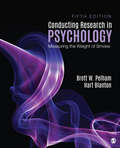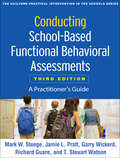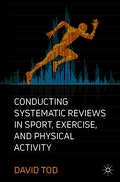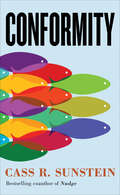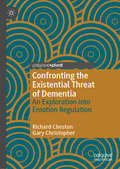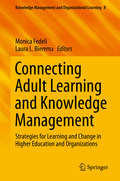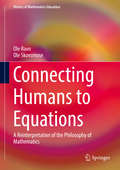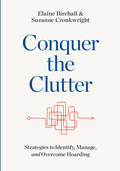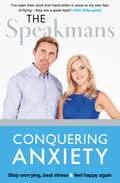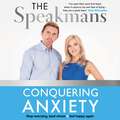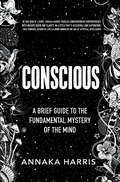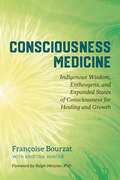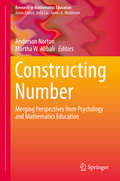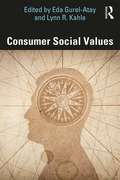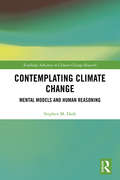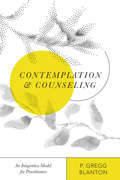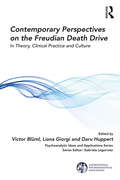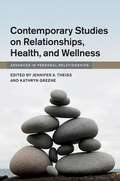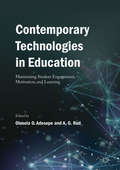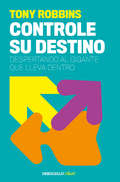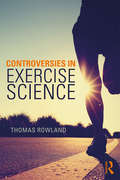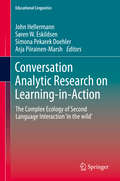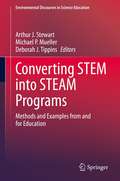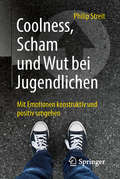- Table View
- List View
Conducting Research in Psychology: Measuring the Weight of Smoke
by Brett W. Pelham Hart C. BlantonConducting Research in Psychology: Measuring the Weight of Smoke provides students an engaging introduction to psychological research by employing humor, stories, and hands-on activities. Through its methodology exercises, learners are encouraged to use their intuition to understand research methods and apply basic research principles to novel problems. Authors Brett W. Pelham and Hart Blanton integrate cutting-edge topics, including implicit biases, measurement controversies, online data collection, and new tools for determining the replicability of a set of research findings. The Fifth Edition broadens its coverage of methodologies to reflect the types of research now conducted by psychologists. Two new chapters accommodate the needs of instructors who incorporate student research projects into their courses.
Conducting School-Based Functional Behavioral Assessments, Third Edition: A Practitioner's Guide (The Guilford Practical Intervention in the Schools Series)
by Mark W. Steege Jamie L. Pratt Garry Wickerd Richard Guare T. Steuart Watson Frank M. GreshamWidely recognized as a gold-standard resource, this authoritative book has been revised and expanded with 50% new material. It provides a complete introduction to functional behavioral assessment (FBA), complete with procedures, forms, and tools that have been piloted and refined in both general and special education settings. Numerous vivid examples illustrate how to use the authors' behavior-analytic problem-solving model (BAPS) to synthesize assessment results and guide the design of individually tailored interventions. Practitioners and students enjoy the engaging, conversational tone. In a large-size format with lay-flat binding for easy photocopying, the book includes 17 reproducible checklists and forms. Purchasers get access to a companion Web page where they can download and print the reproducible materials. New to This Edition *Revised BAPS model reflects the latest research and offers a more comprehensive approach to FBA. *Chapters on professional and ethical standards; analyzing how biological/medical conditions, thoughts, and emotions influence behavior; and analyzing how executive skills deficits influence behavior. *Chapters on testing hypotheses about the functions of problem behavior; testing reinforcer effectiveness; and evaluating function-based interventions. *Chapter providing applied learning experiences for professionals and students. *Most of the reproducible tools are new or revised. This book is in The Guilford Practical Intervention in the Schools Series, edited by T. Chris Riley-Tillman.
Conducting Systematic Reviews in Sport, Exercise, and Physical Activity
by David TodThis book offers a conceptual and practical guide to the systematic review process and its application to sport, exercise, and physical activity research. It begins by describing what systematic reviews are and why they assist scientists and practitioners. Providing step-by-step instructions the author leads readers through the process, including generation of suitable review questions; development and implementation of search strategies; data extraction and analysis; theoretical interpretation; and result dissemination.Conducting Systematic Reviews in Sport, Exercise, and Physical Activity clarifies several common misunderstandings including the difference between qualitative systematic reviews and meta-analyses . Each chapter begins with a set of learning objectives focused on practical application, illustrated with examples from reviews published within the sport, exercise, and physical activity fields. Once a reader has completed all the learning activities along the way, they will have designed a systematic review and have written a protocol ready for registration. The book ends with a collection of advice from internationally regarded scientists with substantial experience in systematic reviews.
Conformity: The Power of Social Influences
by Cass R Sunstein Robert H FrankBestselling author Cass R. Sunstein reveals the appeal and the danger of conformity We live in an era of tribalism, polarization, and intense social division—separating people along lines of religion, political conviction, race, ethnicity, and sometimes gender. How did this happen? In Conformity, Cass R. Sunstein argues that the key to making sense of living in this fractured world lies in understanding the idea of conformity—what it is and how it works—as well as the countervailing force of dissent. An understanding of conformity sheds new light on many issues confronting us today: the role of social media, the rise of fake news, the growth of authoritarianism, the success of Donald Trump, the functions of free speech, debates over immigration and the Supreme Court, and much more. Lacking information of our own and seeking the good opinion of others, we often follow the crowd, but Sunstein shows that when individuals suppress their own instincts about what is true and what is right, it can lead to significant social harm. While dissenters tend to be seen as selfish individualists, dissent is actually an important means of correcting the natural human tendency toward conformity and has enormous social benefits in reducing extremism, encouraging critical thinking, and protecting freedom itself. Sunstein concludes that while much of the time it is in the individual’s interest to follow the crowd, it is in the social interest for individuals to say and do what they think is best. A well-functioning democracy depends on it.
Confronting the Existential Threat of Dementia: An Exploration into Emotion Regulation
by Richard Cheston Gary ChristopherThis book explores how dementia acts as an existential threat, both to people diagnosed with the condition, and to their carers. The authors highlight how dementia not only gradually erodes our most fundamental abilities, but that it does so at a time of life when the resources of individuals, couples, and families are already stretched. While over time many people who are living with dementia are able to adapt to their diagnosis and acknowledge its impact on them, for many others it remains too threatening and painful to do this. The book draws on examples from clinical practice and experimental studies to argue that a range of responses, such as searching for long-dead parents or clinging to previous identities, all represent ways in which people living with dementia attempt to protect themselves against the emotional impact of the condition. Finally, the authors set out new ways of intervening to boost psychological resources and thereby support people in facing the existential threat of dementia.
Connecting Adult Learning and Knowledge Management: Strategies for Learning and Change in Higher Education and Organizations (Knowledge Management and Organizational Learning #8)
by Laura L. Bierema Monica FedeliThis multidisciplinary book represents an initial attempt to connect adult learning and knowledge management in theory and practice. It provides educators, learners and organizational development professionals with new strategies and resources for developing active and effective pedagogies, which in turn prepare learners and practitioners to manage knowledge in organizations and higher education. To do so, it gathers contributions and case studies from a diverse, global team of authors and provides a theoretical and practical outline of new strategies and methods for facilitating adult teaching and learning. It also provides a fresh reading of active learning methods, by adopting a knowledge management viewpoint that is broadly applicable, whether helping students master content in university courses, or helping organizations learn and change.The book is divided into three main sections: a) methods and theories for adult teaching and learning; b) knowledge management in education; and c) case studies and best practices that consider classroom learning, higher education change, and organization development.
Connecting Humans to Equations: A Reinterpretation of the Philosophy of Mathematics (History of Mathematics Education)
by Ole Ravn Ole SkovsmoseConnecting Humans to Equations: A Reinterpretation of the Philosophy of Mathematics presents some of the most important positions in the philosophy of mathematics, while adding new dimensions to this philosophy. Mathematics is an integral part of human and social life, meaning that a philosophy of mathematics must include several dimensions. This book describes these dimensions by the following four questions that structure the content of the book: Where is mathematics? How certain is mathematics? How social is mathematics? How good is mathematics? These four questions refer to the ontological, epistemological, social, and ethical dimension of a philosophy of mathematics. While the ontological and epistemological dimensions have been explored in all classic studies in the philosophy of mathematics, the exploration of the book is unique in its social and ethical dimensions. It argues that the foundation of mathematics is deeply connected to human and social actions and that mathematics includes not just descriptive but also performative features. This human-centered and accessible interpretation of mathematics is relevant for students in mathematics, mathematics education, and any technical discipline and for anybody working with mathematics.
Conquer the Clutter: Strategies to Identify, Manage, and Overcome Hoarding
by Elaine Birchall Suzanne CronkwrightHow to take back your life when your things are taking over.Why does Cliff, a successful lawyer who regularly wins landmark cases, step over two-foot piles of paper whenever he opens his front door? Why do Joan and Paul ask Children's Services to take their three children instead of decluttering their home? Why does Lucinda feel intense pressure to hold onto her family's heirlooms even though she has no room for them? They have hoarding disorder, which an estimated 2% to 6% of the adult population worldwide experience.Conquer the Clutter offers hope to anyone affected by hoarding. Real-life vignettes, combined with easy-to-use assessment and intervention tools, support those who hoard—and those who care about them. Written by Elaine Birchall, a social worker dedicated to helping people declutter and achieve long-term control over their belongings, the book• provides an overview of hoarding, defining what it is—and is not• explains the difference between clutter and hoarding • describes different types of hoarding in detail, including impulse shopping, "closet" hoarding, and animal hoarding• debunks myths about hoarding and hoarders • explores the effects that hoarding has on relationships, on work, and on physical and financial health• presents a practical, step-by-step plan of action for decluttering• contains dedicated advice from individuals who have successfully overcome their hoarding disorderThe most comprehensive work about hoarding on the market, Conquer the Clutter discusses special populations who are not often singled out, such as the disabled and the elderly, and includes numerous worksheets to assist individuals in determining the scope of their hoarding disorder and tackling the problem. Over 40 pages of additional resources are available online at jhupbooks.press.jhu.edu/title/conquer-clutter.
Conquering Anxiety: Stop worrying, beat stress and feel happy again
by Nik Speakman Eva Speakman'I've seen their work first hand when it came to my own fear of flying - they are a great team' HOLLY WILLOUGHBYThe Speakmans' powerful and life-changing guide to conquering anxiety and living a more positive life.The world's leading life-change therapists, the Speakmans, share a passion to help people lead happier and less inhibited lives. Their intellectual curiosity guided them through years of extensive research into behaviourism and conditioning, which led to the creation of their groundbreaking behavioural change therapy known as 'Schema Conditioning'.Based on the Speakmans' unique coaching method this book provides the key to eliminating anxiety. If you suffer from generalised anxiety, panic attacks or feel abnormally anxious about certain things, the Speakmans show you that you can overcome these conditions successfully and enjoy a healthy, carefree life.
Conquering Anxiety: Stop worrying, beat stress and feel happy again
by Nik Speakman Eva Speakman'I've seen their work first hand when it came to my own fear of flying - they are a great team' HOLLY WILLOUGHBYThe Speakmans' powerful and life-changing guide to conquering anxiety and living a more positive life.The world's leading life-change therapists, the Speakmans, share a passion to help people lead happier and less inhibited lives. Their intellectual curiosity guided them through years of extensive research into behaviourism and conditioning, which led to the creation of their groundbreaking behavioural change therapy known as 'Schema Conditioning'.Based on the Speakmans' unique coaching method this book provides the key to eliminating anxiety. If you suffer from generalised anxiety, panic attacks or feel abnormally anxious about certain things, the Speakmans show you that you can overcome these conditions successfully and enjoy a healthy, carefree life.
Conquering Anxiety: Stop worrying, beat stress and feel happy again
by Nik Speakman Eva Speakman'I've seen their work first hand when it came to my own fear of flying - they are a great team' HOLLY WILLOUGHBYThe Speakmans' powerful and life-changing guide to conquering anxiety and living a more positive life.The world's leading life-change therapists, the Speakmans, share a passion to help people lead happier and less inhibited lives. Their intellectual curiosity guided them through years of extensive research into behaviourism and conditioning, which led to the creation of their groundbreaking behavioural change therapy known as 'Schema Conditioning'.Based on the Speakmans' unique coaching method this book provides the key to eliminating anxiety. If you suffer from generalised anxiety, panic attacks or feel abnormally anxious about certain things, the Speakmans show you that you can overcome these conditions successfully and enjoy a healthy, carefree life.(p) Orion Publishing Group 2019
Conscious: A Brief Guide to the Fundamental Mystery of the Mind
by Annaka HarrisAs concise and enlightening as Seven Brief Lessons on Physics and Astrophysics for People in a Hurry, this mind-expanding dive into the mystery of consciousness is an illuminating meditation on the self, free will, and felt experience.What is consciousness? How does it arise? And why does it exist? We take our experience of being in the world for granted. But the very existence of consciousness raises profound questions: Why would any collection of matter in the universe be conscious? How are we able to think about this? And why should we?In this wonderfully accessible book, Annaka Harris guides us through the evolving definitions, philosophies, and scientific findings that probe our limited understanding of consciousness. Where does it reside, and what gives rise to it? Could it be an illusion, or a universal property of all matter? As we try to understand consciousness, we must grapple with how to define it and, in the age of artificial intelligence, who or what might possess it. Conscious offers lively and challenging arguments that alter our ideas about consciousness—allowing us to think freely about it for ourselves, if indeed we can.
Consciousness Medicine: Indigenous Wisdom, Entheogens, and Expanded States of Consciousness for Healing Healing and Growth
by Françoise Bourzat Kristina Hunter"Françoise Bourzat has written an authoritative book on guided psychedelic therapy with important lessons for anyone thinking of either guiding or being guided.” —Michael Pollan via TwitterA comprehensive guide to the safe and ethical application of expanded states of consciousness for therapists, healing practitioners, and sincere explorers Psychedelic medicines also known as entheogens are entering the mainstream. And it’s no wonder: despite having access to the latest wellness trends and advances in technology, we’re no healthier, happier, or more meaningfully connected. Psilocybin mushrooms, ayahuasca, and LSD—as well as other time-tested techniques with the power to shift consciousness such as drumming, meditation, and vision quests—are now being recognized as potent catalysts for change and healing. But how do we ensure that we’re approaching them effectively? Françoise Bourzat—a counselor and experienced guide with sanctioned training in the Mazatec and other indigenous traditions—and healer Kristina Hunter introduce a holistic model focusing on the threefold process of preparation, journey, and integration. Drawing from more than thirty years of experience, Bourzat’s skillful and heartfelt approach presents the therapeutic application of expanded states, without divorcing them from their traditional contexts. Consciousness Medicine delivers a coherent map for navigating nonordinary states of consciousness, offering an invaluable contribution to the field of healing and transformation.
Constructing Number: Merging Perspectives From Psychology And Mathematics Education (Research In Mathematics Education Ser.)
by Anderson Norton Martha W. AlibaliThe book synergizes research on number across two disciplines—mathematics education and psychology. The underlying problem the book addresses is how the brain constructs number. The opening chapter frames the problem in terms of children’s activity, including mental and physical actions. Subsequent chapters are organized into sections that address specific domains of number: natural numbers, fractions, and integers. Chapters within each section address ways that children build upon biological primitives (e.g., subitizing) and prior constructs (e.g., counting sequences) to construct number. The book relies on co-authored chapters and commentaries at the end of each section to create dialogue between junior faculty and senior researchers, as well as between psychologists and mathematics educators. The final chapter brings this work together around the framework of children’s activity and additional themes that arise in the collective work. The book is aimed to appeal to mathematics educators, mathematics teacher educators, mathematics education researchers, educational psychologists, cognitive psychologists, and developmental psychologists.
Consumer Social Values (Marketing and Consumer Psychology Series)
by Eda Gurel-Atay Lynn R. KahleSocial values are central to people’s lives, guiding behaviors, and judgments, and defining who we are. This book advances understanding of consumer social values and their roles in the global marketplace by refining and directing existing knowledge of consumer behaviors. With a diverse set of contributors from different parts of the world, this engaging collection provides a unique examination of social values through cross-cultural research. It incorporates input from researchers with varying academic backgrounds from marketing to psychology and philosophy, and also focuses on a range of methodological approaches including surveys, ethnography, interviews, semantic analysis, and neuroscience. The book introduces innovative concepts and provides comprehensive coverage of several specialized areas, to offer an important contribution to values research and discussion. Key topics include values and choice; means-end chains; relations among goals; motives; religion and personality; value measurement and values related to specific services and industries. Consumer Social Values is an essential resource for scholars, students, and practitioners of consumer psychology and marketing communications.
Contemplating Climate Change: Mental Models and Human Reasoning (Routledge Advances in Climate Change Research)
by Stephen M. DarkGlobal climate change policy has failed us all, but what is the reasoning that underlies this failure? Why are some people more disposed to reflect on confounding issues like climate change, recognise the danger, seek a solution, and act accordingly, more than others? This book is concerned with how we think and act in response to climate change. In particular, faced with deep uncertainty and the multifaceted complexities that characterise the climate change conundrum, how the various actors and institutions involved in the policymaking process make decisions that both aid and impede in the design and implementation of climate change policy. This book focuses on how these actors and institutions frame and use the knowledge available – under conditions of competing ideologies and interests – and synthesise it to form often-disparate mental models, or worldviews, that inspire them to become firm advocates of meaningful climate change action or indeed, sceptics that continue to downplay the threat, and hence the need for urgency. By exploring how we think about climate change and the disparate mental models we hold as a result, this book explores why humankind has thus far failed in its endeavours to solve the climate change problem. This book will be of great interest to students and scholars of climate change, environmental policy and environmental psychology.
Contemplation and Counseling: An Integrative Model for Practitioners (Christian Association for Psychological Studies Books)
by P. Gregg BlantonInterest in mindfulness and contemplative thought is growing among Christians, and it's time to consider the place of contemplative prayer within the field of counseling. Can contemplative prayer be integrated into therapeutic work? Can it in fact serve as a foundation on which to build a new approach to counseling? In Contemplation and Counseling Gregg Blanton presents a new paradigm for integrating contemplative prayer with counseling practice. He contends that contemplative prayer can illuminate the purposes of counseling and suggest interventions that help us accomplish these goals. This paradigm builds an alliance between science, theology, and Christian contemplative thought to create a dynamic approach to counseling and balance various dimensions of the human person: emotion, cognition, and action. And by recognizing the power of both words and silence, it harmonizes their functions. Based on this integrative foundation, Blanton offers eleven fundamental interventions to fit the needs of clients (including silence, empathy, and teaching contemplative prayer) and a practical four-stage process for helping clients change, using examples from his own counseling experience and from the Bible. Ultimately, contemplative prayer leads us to the healing power of love. How we view our clients, the ways that we relate with them, and the strategies that we use to help them change are all informed by our loving search for God in contemplative prayer. Particular topics include how Christian contemplation compares with therapeutic uses of mindfulness insights from interpersonal neurobiology understood in light of Scripture psychological and spiritual benefits of lectio divina and centering prayer how practicing contemplative prayer can help counselors develop traits that correlate with positive client outcomes when and how to teach contemplative practices to clients the role of the body, emotions, conscious and unconscious mind, and behavior in contemplative practice and counseling
Contemporary Perspectives on the Freudian Death Drive: In Theory, Clinical Practice and Culture (The International Psychoanalytical Association Psychoanalytic Ideas and Applications Series)
by Victor Blüml Liana Giorgi Daru HuppertContemporary Perspectives on the Freudian Death Drive provides a sustained discussion of the death drive from the perspective of different psychoanalytic traditions. Ever since Freud introduced the notion of the death drive, it has been the subject of intense debate in psychoanalysis and beyond. The death drive is arguably the most unsettling psychoanalytic concept. What this concept points to is more unsettling still. It uniquely illuminates the forces of destruction and dissolution at work in individuals as well as in society. This book first introduces Freud’s use of the term, tracing the debates and developments his ideas have led to. The subsequent essays by leading Viennese psychoanalysts demonstrate the power of the death drive to illuminate psychoanalytic theory, clinical practice, and the study of culture. Since this book originally arose from a conference in Vienna, its final segment is dedicated to the forced exile of the early Viennese psychoanalysts due to the Nazi threat. Due to its wide scope and the many perspectives it offers, this book is a tribute to the disturbing relevance of the death drive today. Contemporary Perspectives on the Freudian Death Drive is of special interest to psychoanalysts, psychotherapists, social and cultural scientists, as well as anyone intending to understand the sources and vicissitudes of human destructiveness.
Contemporary Studies on Relationships, Health, and Wellness (Advances in Personal Relationships)
by Jennifer A. Theiss Kathryn GreeneClose relationships are a vital part of people's daily lives; thus family members, friends, and romantic partners play an integral role in people's health and well-being. Understanding the ways in which close relationships both shape and reflect people's health and wellness is an important area of inquiry. Showcasing studies from various disciplines that are on the cutting-edge of research exploring the interdependence between health and relationships, this collection highlights several relationship processes that are instrumental in the maintenance of health and the management of illness, including interpersonal influence, information management, uncertainty, social support, and communication. Although the existing health literature is rich with knowledge about individual and ecological factors that are influential in promoting certain health behaviors, the relationship scholars featured in this volume have much to contribute in terms of documenting the interpersonal dynamics that are involved in experiences of health and illness.
Contemporary Technologies in Education: Maximizing Student Engagement, Motivation, and Learning
by A. G. Rud Olusola O. AdesopeThis edited volume provides a critical discussion of theoretical, methodological, and practical developments of contemporary forms of educational technologies. Specifically, the book discusses the use of contemporary technologies such as the Flipped Classroom (FC), Massive Open Online Course (MOOC), Social Media, Serious Educational Games (SEG), Wikis, innovative learning software tools, and learning analytic approach for making sense of big data. While some of these contemporary educational technologies have been touted as panaceas, researchers and developers have been faced with enormous challenges in enhancing the use of these technologies to arouse student attention and improve persistent motivation, engagement, and learning. Hence, the book examines how contemporary technologies can engender student motivation and result in improved engagement and learning. Each chapter also discusses the road ahead and where appropriate, uses the current trend to predict future affordances of technologies.
Controle su destino: Despertando el gigante que lleva dentro
by Anthony RobbinsUn viaje de autodescubrimiento cuya estación final es la más plena y satisfactoria realización de uno mismo. ¿Se deja arrastrar por circunstancias que parecen estar fuera de su control? Esa carencia de autodominio es consecuencia de múltiples factores: hábitos negativos, escaso conocimiento de los propios valores personales, dificultades en las relaciones con los demás... Todo ello causa esa angustiosa sensación de estar manejado por los otros, por «lo» otro. En Controle su destino, Anthony Robbins propone una serie de pautas sencillas de seguir que nos ayudan a descubrir nuestras creencias más profundas, nuestras preguntas fundamentales. Los lectores han dicho...«Impresionante. Leer sí o sí. Top10 de los últimos 100 que he leído. Libro de referencia. Recomendadísimo en todos los sentidos.» «Un maravilloso libro para "controlar tu destino". Aporta información y herramientas útiles para aplicar en tu vida y para aplicar en sesiones de coaching personal» «Si te gusta leer libros de autoayuda este, para mí, es EL LIBRO.»
Controversies in Exercise Science
by Thomas RowlandControversies in Exercise Science introduces a series of selected unresolved issues in the field of human exercise science. The common thread to all of these topics is that, in their ultimate resolution, they offer promise of insights into the essential principles of physiological systems and how these respond to the stresses of exercise. Each case study includes an examination of research surrounding each issue; the innovative aspect, however, will be that each of these controversies will be presented in the context of an historical and/or philosophical perspective. These chapter include topics related to basic exercise physiology, sports, physical activity, and exercise health. Underlying each of these debates lie clues which may offer insights into the basic nature of living beings. Aimed at both academics and practitioners in the fields of exercise science, biology, and related sports science disciplines, Controversies in Exercise Science provides arguments for both sides of several selected contemporary controversies in the field of exercise science and, while no ultimate resolution will be provided, the goal is, rather, to offer the reader sufficient "raw material" on which he or she might make their own judgement on the matters presented.
Conversation Analytic Research on Learning-in-Action: The Complex Ecology of Second Language Interaction ‘in the wild’ (Educational Linguistics #38)
by John Hellermann Søren W. Eskildsen Simona Pekarek Doehler Arja Piirainen-MarshThis volume offers insights on language learning outside the classroom, or in the wild, where L2 users themselves are the driving force for language learning. The chapters, by scholars from around the world, critically examine the concept of second language learning in the wild. The authors use innovative data collection methods (such as video and audio recordings collected by the participants during their interactions outside classrooms) and analytic methods from conversation analysis to provide a radically emic perspective on the data. Analytic claims are supported by evidence from how the participants in the interactions interpret one another’s language use and interactional conduct. This allows the authors to scrutinize the term wild showing what distinguishes L2 practices in our different datasets and how those practices differ from the L2 learner data documented in other more controlled settings, such as the classroom. We also show how our findings can feed back into the development of materials for classroom language instruction, and ultimately can support the implementation of usage-based L2 pedagogies. In sum, we uncover what it is about the language use in these contexts that facilitates developmental changes over time in L2-speakers' and their co-participants' interactional practices for language learning.
Converting STEM into STEAM Programs: Methods and Examples from and for Education (Environmental Discourses in Science Education #5)
by Michael P. Mueller Deborah J. Tippins Arthur J. StewartThis book examines the push and pull of factors contributing to and constraining conversion of STEM (science, technology, engineering and math) education programs into STEAM (science, technology, engineering, math and arts) education programs. The chapters in this book offer thought-provoking examples, theory, and suggestions about the advantages, methods and challenges involved in making STEM to STEAM conversions, at levels ranging from K12 through graduate university programs. A large driving force for STEM-to-STEAM conversions is the emerging awareness that the scientific workforce finds itself less than ideally prepared when engaging with so-called ‘wicked problems’ – the complex suite of emerging, multifaceted issues such as global climate change, social injustice, and pandemic diseases. Dealing with these issues requires cross-disciplinary expertise and the ability to insert technical and scientific understanding effectively into areas of public planning and policy. The different models and possibilities for STEAM, as the next phase of the STEM revolution, laid out in this book will promote research and further our understanding of STEAM as a forward-thinking approach to education.Gillian Roehrig, STEM Education, University of Minnesota, USAThe ideal teacher sees opportunities for integrating ideas from multiple disciplines into every lesson. This book offers many worthwhile suggestions on how to do that deliberately and systematicallyGeorge DeBoer, Project 2061 of the American Association for the Advancement of Science, USAFor the last several years, calls for expanding STEM education have grown, but so too have concerns about technocratic approaches to STEM. This volume challenges the community to consider broader views on STEM by focusing on the place of arts education within this movement. The chapters offer much needed, new perspectives on the (re)integration of the arts and sciencesTroy Sadler, School of Education, University of North Carolina, USA
Coolness, Scham und Wut bei Jugendlichen: Mit Emotionen Konstruktiv Und Positiv Umgehen
by Philip StreitGeborgenheit, Autonomie und Erfolg, das wünschen sich junge Menschen. In diesem Rahmen entwickeln sie Lösungsversuche, um sich diese grundlegenden psychologischen Bedürfnisse zu erfüllen. Sind diese nicht angemessen, reagiert die Umgebung oft mit abwertenden Reaktionen. Schnell entsteht bei den Jugendlichen Scham. Und: Es ist vor allem der Verlust der Würde, der es für sie so schwer macht. Philip Streit arbeitet seit über 20 Jahren mit jungen Menschen und mit deren Familien. In diesem Buch zeigt er Eltern und interessierten Laien, welche Kraft in Neuer Autorität und Positiver Psychologie steckt, damit Erwachsene respektvoll und präsent an Jugendliche herangehen können, und wie sie diese Scham für gelingende Beziehungen nützen können. Zahlreiche Fallbeispiele und Übungen erleichtern die Umsetzung im Alltag. Die Erfahrung zeigt: Wer das übt und ausprobiert, ist nicht nur von den günstigen Auswirkungen überrascht, sondern auch davon, wie leicht es gelingt.Geschrieben für … Eltern, interessierte Laien; Psychotherapeuten, Psychologen, Ärzte, Schulberater, Lehrer können mitlesen.Der AutorDr. Philip Streit leitet das Institut für Kind, Jugend und Familie in Graz, wo er als Klinischer Psychologe und Psychotherapeut mit Kindern, Jugendlichen und ihren Familien arbeitet. Er ist Autor verschiedener Bücher über Neue Autorität und Positive Psychologie im Alltag mit Kindern und Jugendlichen.
